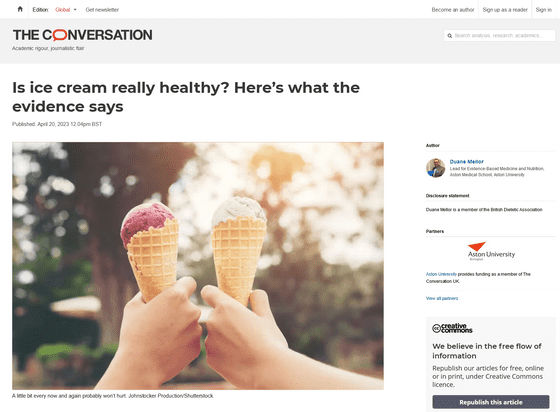Is it true that ice cream is healthy?

On April 13, 2023, The Atlantic, a traditional monthly magazine founded in 1857, published
Is ice cream really healthy?
https://theconversation.com/is-ice-cream-really-healthy-heres-what-the-evidence-says-203990

The Atlantic article was based on
In the study, Korat and colleagues analyzed medical examination data and dietary records of a total of about 16,000 people with type 2 diabetes at the start of each study, and found that those who ate ice cream twice a week did not. They were found to be 12% less likely to develop cardiovascular disease than humans.
Regarding the reaction at the time of the publication of the paper, The Atlantic introduced an episode that ``The knowledge that desserts full of fat and sugar are actually good for the body has surprised experts in America's most influential nutrition department.'' doing.

When I heard that type 2 diabetics who ate ice cream had a lower risk of cardiovascular disease, The Atlantic pointed out, ``Ice cream has a mysterious health effect.'' There are pitfalls, says Duane Mellor of Aston University, UK.
It is possible that participants with type 2 diabetes who ate ice cream on a daily basis changed their eating habits after the study began. Dietary analyzes were recorded one year prior to the start of the study, and participants were not advised to continue or stop consuming ice cream after the study began. .
Therefore, the possibility that participants who were diagnosed with type 2 diabetes and became aware that they were prone to cardiovascular disease stopped eating ice cream suddenly after the start of the survey cannot be ruled out. In that case, rather than eating ice cream leading to a reduction in the risk of cardiovascular disease, the possibility that ``stopping eating ice cream lowers the risk of cardiovascular disease'' cannot be denied.

It should also be noted that this study is an observational study and only shows an association between ice cream consumption and a reduced risk of cardiovascular disease. To conclude that ice cream has health benefits, it is necessary to prove a causal relationship that 'ice cream consumption reduced the risk of cardiovascular disease'. However, the original paper only tells us that there is some connection.
To prove a causal relationship, for example, ``a clinical trial in which subjects are divided into two groups, one is given ice cream and the other is given a placebo that is not ice cream, and long-term monitoring'' is required. However, such experiments are costly and unlikely to materialize without substantial funding from the food industry.
Interest in ice cream is high, so it wouldn't be surprising if such studies were already being conducted, but surprisingly few studies have investigated the health effects of ice cream alone. One of the few studies looking at the effects of ice cream on the body is a 2019
The study showed that eating lots of ice cream may increase the risk of type 2 diabetes and non-alcoholic fatty liver disease, a risk factor for heart disease . However, researchers have found similar associations not only with ice cream but also with other foods such as red meat. 'This shows that the quality of a person's overall diet, rather than specific foods, is important for health,' Mellor said.

It's not all bad news for ice cream lovers. According to Mellor, evidence has grown over the past two decades that milk fat has some potential benefits. In particular, fermented milk products such as yogurt and cheese have been reported to potentially reduce the risk of heart disease and type 2 diabetes. Ice cream also contains milk fat, but more research is needed to determine whether it is as effective as yogurt or cheese.
Studies have also shown that a diet rich in calcium may reduce the risk of type 2 diabetes and heart disease. However, calcium is abundantly contained in dairy products other than ice cream, beans, nuts, etc., and there is no disadvantage that there is a lot of sugar like ice cream.
In this regard, Meller said, ``While news about the unexpected health benefits of your favorite foods is exciting, it's important to scrutinize the research because it's possible that the research is wrong, or that other diets or lifestyles are wrong. Factors such as habits often exaggerate the effects of certain foods.'
Mellor also advises ice cream lovers: 'So far, there is no high-quality evidence to show that ice cream has any specific health benefits. That said, even a healthy diet and exercise Eating a modest amount of ice cream two or three times a week doesn't seem too bad if you're careful.'
Related Posts:







